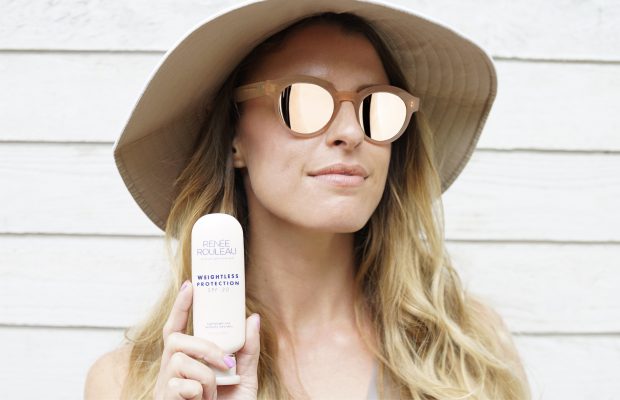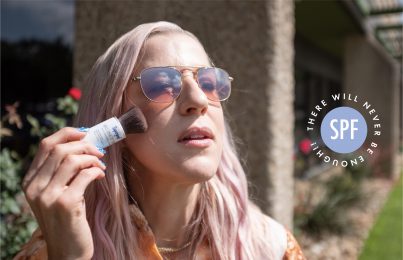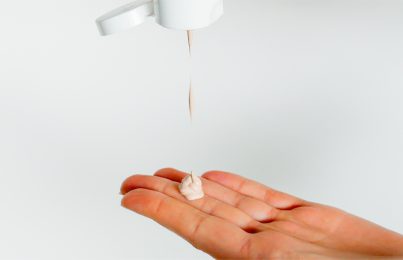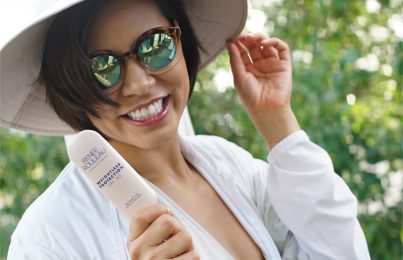Updated 05/25/23. You already know how important it is to wear sunscreen daily, but choosing the right sunscreen for your skin can be complicated. What you should know is that there are two types of sunscreen: physical and chemical. But which one is most effective? And which one is the best for sensitive or breakout-prone skin?
The answer isn’t simple. In fact, there’s a big debate as to which one is the best (not to mention a lot of mixed research). In this post, I’ll explain the main differences between physical and chemical sunscreens, as well as the pros and cons of each. My goal is to help you make an informed decision as to which sunscreen is best for your skin type!
Physical Sunscreen
Physical sunscreen contains active mineral ingredients such as titanium dioxide or zinc oxide. Physical sunscreens work by sitting on top of the skin to form a shield, scattering UV rays away from the skin. This is why they’re referred to as physical blockers.
Physical Sunscreen Pros
- Offers protection against UVA and UVB rays (it’s naturally broad-spectrum)
- Protects skin from the sun as soon as it’s applied; there’s no wait time for it to take effect
- Lasts longer than chemical sunscreen when exposed to direct UV light (but NOT when doing physical activities that cause the skin to get wet or sweaty)
- Less likely to cause irritation or a stinging sensation, making it better for sensitive skin types
- Better for those with heat-activated skin (like those with rosacea or redness) since it deflects the heat given off by the sun
- Less likely to clog pores, making it ideal for breakout-prone skin types (of course, this will depend on the other ingredients used in the formula)
Physical Sunscreen Cons
- Can rub, sweat, or rinse off easily, meaning more frequent reapplication is needed
- May leave a white cast on the skin, making some formulas incompatible with darker skin tones (although tinted formulas are available)
- Tends to be thicker, which will require more effort to rub in
- May create an occlusive film (barrier), which results in increased perspiration during physical activities
- Won’t offer full protection unless it’s applied generously and accurately. Otherwise, UV light can get through gaps in the sunscreen molecules and penetrate the skin (FYI, here’s how much sunscreen you should apply to your face and neck)
Chemical Sunscreen
Chemical sunscreen contains organic (carbon-based) compounds such as oxybenzone, octinoxate, octisalate, and avobenzone, which create a chemical reaction. Instead of blocking and scattering UV rays, chemical sunscreen absorbs UV rays. It changes them into heat and releases that heat from the skin. Because of this, they are often referred to as chemical or organic absorbers.
Chemical Sunscreen Pros
- Tends to be thinner and, therefore, spreads more easily, making it more wearable for daily use (especially under makeup)
- Spreads uniformly on the skin, avoiding the risk of there being gaps between the sunscreen molecules after application
- Easier to add other ingredients like peptides, antioxidants, and enzymes that can offer additional skin-protecting benefits
Chemical Sunscreen Cons
- Can potentially exacerbate dark spots and discoloration due to the chemical reaction that increases internal skin temperature (yes, heat can make brown spots worse)
- Requires 10-15 minutes to become effective after application
- Increased chance of irritation (especially for those who have a damaged moisture barrier) due to the multiple ingredients combined to achieve broad-spectrum protection
- Increased chance of flushing for redness-prone skin types since it changes UV rays into heat
- Doesn’t last as long as physical sunscreen when exposed to direct UV light, which means more frequent reapplication is necessary
- The chemical ingredients oxybenzone and octinoxate have been banned in Hawaii for posing a risk to coral reefs when worn while swimming in the ocean (Note: This applies to water-resistant sunscreens only and not daily-use sunscreens or makeup with sunscreen)
- Depending on the formula, it could be pore-clogging (but not necessarily)
What’s the Verdict? Is Physical or Chemical Sunscreen Better?
As for which sunscreen offers the best UVA/UVB protection, there’s a huge debate going on among scientists. Currently, the FDA is taking steps to establish new standards for measuring the efficacy of sunscreens more accurately. For now, however, both physical and chemical sunscreens will do a great job of protecting your skin, as long as you’re applying them generously, and as long as they’re listed as broad-spectrum. This means they will protect the skin from UVA rays in addition to UVB rays.
When it comes down to it, the best sunscreen to use is…the one that feels the most comfortable on your skin. Yes, really! This way, you’ll be more likely to wear it every day as directed.
If you have an oilier skin type, like Skin Types 1, 2, 3, or 4, you’ll want to find a sunscreen that’s lightweight. If you consider yourself sensitive and your skin gets red easily, you’ll want to find a sunscreen that doesn’t cause excess redness or irritation. If you have clogged pores, you’ll want to look for a formula that doesn’t include pore-clogging ingredients. And finally, if you have a deeper skin tone, you’ll want sunscreen that doesn’t leave a white cast. Simply use whichever sunscreen works best for you and feels best on your skin!
And don’t think you need to wear an SPF 50 or greater. Higher numbers on labels are more about marketing than anything else. In fact, the FDA is proposing a ban on sunscreens that are labeled with an SPF number higher than 50 since there is no scientific evidence showing that they offer more protection than lower numbers. That’s why I recommend a minimum SPF of 30 and a maximum SPF of 50.
My Personal Sunscreen Recommendations
For Daily Use Under Makeup
I wear Weightless Protection SPF 30 almost every single day. It’s formulated with BOTH physical and chemical filters, so I feel I get the best of both worlds. It’s also incredibly lightweight and non-greasy, so it won’t cause problems for people who have breakout-prone skin.
To enhance the effects of sunscreen, I apply an antioxidant serum underneath my SPF each morning (the Vitamin C&E Treatment to be specific). Not only does it protect my skin from damaging free radicals, but it increases my sunscreen’s efficacy. In fact, Duke University Medical Center researchers determined that wearing both vitamins C and E under sunscreen actually provides four times the protection of sunscreen alone.
For Easy Reapplication Throughout the Day
I dust on an SPF-infused mineral powder every few hours throughout the day. ColoreScience and Jane Iredale make ones that I like. You can also use any pressed or loose powder makeup that contains titanium dioxide, which is one of the active ingredients used in physical sunscreens. If it doesn’t say it has SPF in it, it’s simply because the brand chose not to go through the extensive sunscreen testing needed, and therefore they aren’t marketing it as a true sunscreen. But again, if it lists titanium dioxide on the ingredient list, it will provide some sun protection.
Read four ways to reapply sunscreen over makeup.
For Outdoor Use When I’m Sweating or Swimming
I use either La Roche-Posay Anthelios SPF 50 Mineral Ultra Light Sunscreen Fluid or Neutrogena Clear Face Oil-Free Sunscreen SPF 55. Since Weightless Protection SPF 30 is meant for daily use and is not water-resistant, I’ll switch to something that will hold up better. The La Roche-Posay sunscreen uses zinc oxide exclusively, so it is a purely physical sunscreen. It rubs in fairly well but can leave a little white cast on my face. They do make it in a tinted version, so sometimes I’ll mix in a bit of that if the zinc oxide is showing up too much.
Another trick I use when I know I’ll be spending a lot of time outdoors being active is to layer sunscreens. I’ll start with a chemical sunscreen to cover my base. Then, before heading out, I’ll layer a physical sunscreen over it to create a barrier.
The Bottom Line
There are pros and cons to both physical and chemical sunscreen filters, but at the end of the day, both will protect you from UV damage as long as they’re applied generously and often. It all comes down to choosing a formula that’s compatible with your skin so that you use sunscreen every single day.
Every skin type is different, so you might just have to experiment with different formulas until you find one you like. Trust me—there is one out there that is perfect for you. Since sunscreen is the number one best anti-aging product you can use, it’s worth it to find one that you’ll wear every single day, rain or shine, inside or outside.
Next, read up on 5 skincare mistakes that could be making your sunscreen less effective.
Celebrity Esthetician & Skincare Expert
As an esthetician trained in cosmetic chemistry, Renée Rouleau has spent 30 years researching skin, educating her audience, and building an award-winning line of products. Her hands-on experience as an esthetician and trusted skin care expert has created a real-world solution — products that are formulated for nine different types of skin so your face will get exactly what it needs to look and feel its best. Trusted by celebrities, editors, bloggers, and skincare obsessives around the globe, her vast real-world knowledge and constant research are why Marie Claire calls her “the most passionate skin practitioner we know.”




Comments:
Thank you for this easy to digest info! So good to get a breakdown of pros and cons. I have heard though (from Dr. Dray) that while previously the numbers on SPF were considered unimportant, newer studies have shown that higher SPF actually does provide longer protection. Just curious which is accurate! Thank you!
Posted By: Stevie Rae Maier |
Hi there! Since the most reliable way to ensure your sunscreen is working is to reapply I would suggest resisting the temptation of relying on a high SPF for protection.
Posted By: Ella Stevenson |
Thank you so much for this info, very helpful. I am African American, deep tone, and it is a challenge finding a sunscreen that doesn’t leave a white cast on my skin. I would love to try your weightless, but would like to know if it will absorb enough not to leave the white residue. Looking forward to trying your product line.
Posted By: Ericks |
Thank you for reading the post! The Weightless Protection SPF 30 goes on white at first due to the zinc in the formula. However, after you massage it into the skin it will not leave a white residue.😊
Posted By: Ella Stevenson |
Hey, I have a question – can I use both chemical and mineral sunscreen?
The thing is – chemical sunscreens go so much better under makeup, but mineral sunscreens are easier to reapply. So, can I apply a chemical sunscreen in the morning under my foundation and mineral powder when it’s time to reapply?
Or do you have some better, practical solution?
Love your blog BTW and your advice helped me a lot in the past…
Posted By: Jovana |
Yes, this is a great solution! Our Weightless Protection SPF 30 actually uses both chemical and physical blockers. A great way to re-apply SPF throughout the day is to dust on a mineral sunscreen powder.
Posted By: Renée Rouleau |
Hi, thanks for the informative post! Regarding Vitamin C+E (+ferulic) I used a formula from a reputable company in the past that actually caused my skin to become MORE sun sensitive. My skin is already quite sun sensitive so I was surpised at this. I didn’t change anything apart from adding the C serum…is this possible with vitamin C antioxidants?
Posted By: Deb |
Hi,
I just wanted to know – I keep reading about the importance of maintaining a neutral pH on your skin, and yet from what I understand, physical sunscreen needs a high pH (7-8) to function properly. This might explain why I’ve been having such dry skin lately (I use zinc oxide sunscreen every day, and apply every 2 hours). What can I do about this and what options aside from chemical sunscreen, which irritate my skin, do I have? Thanks so much and I love your blog/products!
– J
Posted By: Jessica |
I am not aware of how a a skin pH can make a sunscreeen not be as effective and have read no such studies about this so you may want to check the source of the info. My general advice is to use a gentle, non-drying cleanser (and any non-drying product for that matter) and a well-formulated, broad spectrum sunscreen.
Posted By: Renée Rouleau |